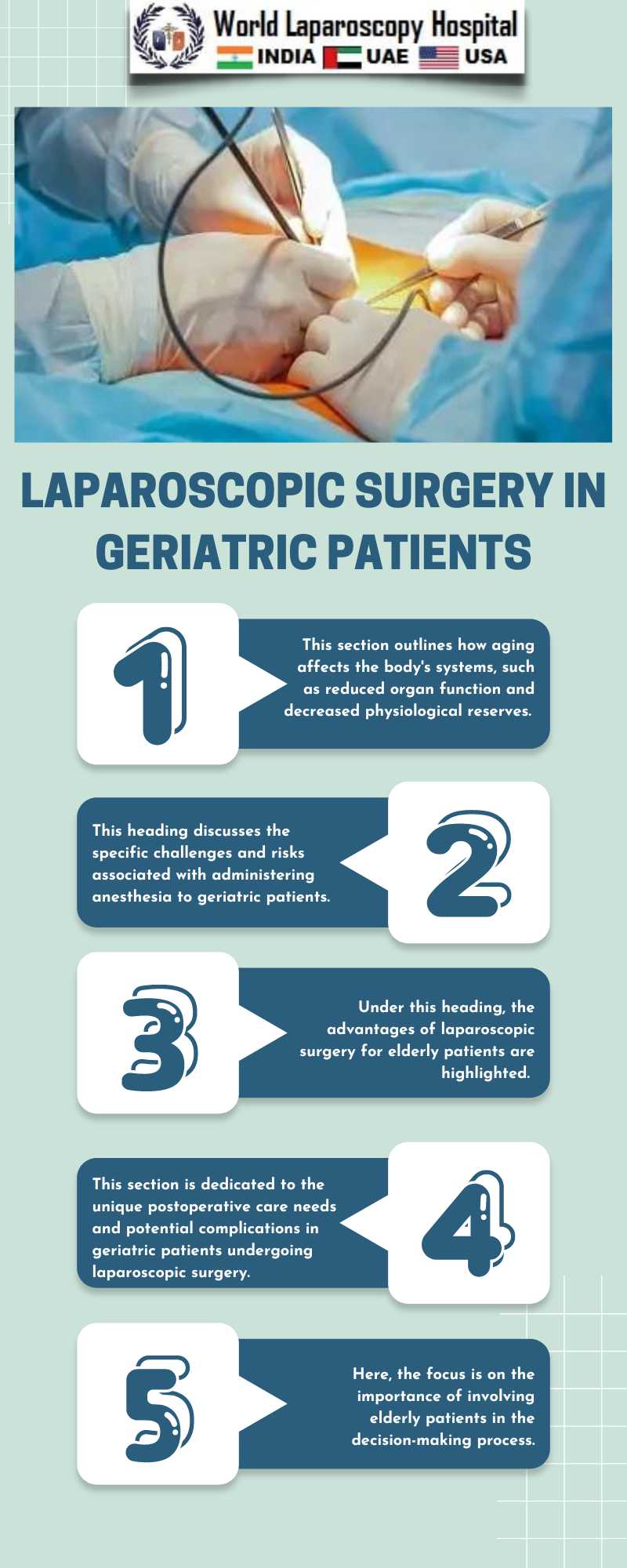Laparoscopic Surgery in Geriatric Patients: Unique Risks and Care
Laparoscopic surgery, a minimally invasive surgical technique, has significantly evolved and is now widely utilized in various medical specialties. Its application in geriatric patients, however, presents unique challenges and considerations. This essay delves into the specifics of laparoscopic surgery when performed on elderly patients, focusing on the inherent risks and specialized care requirements.
1. Introduction to Laparoscopic Surgery
Laparoscopic surgery involves small incisions and the use of a camera and specialized instruments. This approach offers several advantages over traditional open surgery, including reduced pain, quicker recovery, and lower risk of infections. However, the peculiarities of geriatric physiology necessitate a more nuanced understanding of its implications in elderly patients.

2. Geriatric Patients: A Special Demographic
Geriatric patients, typically classified as individuals aged 65 years and older, present a unique medical profile. This group often has multiple comorbidities, reduced physiological reserves, and increased sensitivity to surgical stress. These factors significantly impact the approach and management of surgical interventions in this demographic.
3. Risks Associated with Laparoscopic Surgery in the Elderly
While laparoscopic surgery is generally safer and less invasive, it is not without risks, especially in the elderly. Key risks include:
- Cardiopulmonary Risks: The insufflation of gas into the abdomen to create a working space can affect cardiopulmonary function, a concern in patients with existing heart and lung conditions.
- Anesthetic Risks: Geriatric patients often require careful anesthetic management due to altered drug metabolism and increased sensitivity to medications.
- Reduced Physiological Reserve: The stress of surgery and anesthesia can be particularly taxing for elderly patients with limited physiological reserves.
- Postoperative Complications: These patients are at a higher risk for postoperative complications like infections, thromboembolism, and delayed wound healing.
4. Specialized Preoperative Assessment
A thorough preoperative assessment is crucial. This includes a comprehensive evaluation of the patient's medical history, current medications, and a detailed analysis of their cardiac, pulmonary, renal, and cognitive functions. Geriatric-specific assessment tools can be instrumental in this process.
5. Intraoperative Care
During the surgery, special attention is needed to maintain hemodynamic stability. Adjustments in gas insufflation pressure and careful patient positioning are essential to minimize cardiopulmonary compromise. The surgical team must also be adept at managing the specific challenges that may arise with elderly patients.
6. Postoperative Care and Rehabilitation
Postoperative care for elderly patients undergoing laparoscopic surgery demands a multidisciplinary approach. Pain management, early mobilization, nutritional support, and vigilant monitoring for complications are pivotal. Rehabilitation programs should be tailored to the individual's baseline functional status, with a focus on restoring mobility and independence.
Conclusion
Laparoscopic surgery in geriatric patients offers the benefits of minimally invasive surgery but comes with distinct challenges. The successful surgical management of elderly patients requires an understanding of their unique physiological changes, comprehensive preoperative assessment, meticulous intraoperative techniques, and specialized postoperative care. With these considerations, laparoscopic surgery can be a safe and effective option for the elderly, enhancing their surgical outcomes and quality of life.
1. Introduction to Laparoscopic Surgery
Laparoscopic surgery involves small incisions and the use of a camera and specialized instruments. This approach offers several advantages over traditional open surgery, including reduced pain, quicker recovery, and lower risk of infections. However, the peculiarities of geriatric physiology necessitate a more nuanced understanding of its implications in elderly patients.

2. Geriatric Patients: A Special Demographic
Geriatric patients, typically classified as individuals aged 65 years and older, present a unique medical profile. This group often has multiple comorbidities, reduced physiological reserves, and increased sensitivity to surgical stress. These factors significantly impact the approach and management of surgical interventions in this demographic.
3. Risks Associated with Laparoscopic Surgery in the Elderly
While laparoscopic surgery is generally safer and less invasive, it is not without risks, especially in the elderly. Key risks include:
- Cardiopulmonary Risks: The insufflation of gas into the abdomen to create a working space can affect cardiopulmonary function, a concern in patients with existing heart and lung conditions.
- Anesthetic Risks: Geriatric patients often require careful anesthetic management due to altered drug metabolism and increased sensitivity to medications.
- Reduced Physiological Reserve: The stress of surgery and anesthesia can be particularly taxing for elderly patients with limited physiological reserves.
- Postoperative Complications: These patients are at a higher risk for postoperative complications like infections, thromboembolism, and delayed wound healing.
4. Specialized Preoperative Assessment
A thorough preoperative assessment is crucial. This includes a comprehensive evaluation of the patient's medical history, current medications, and a detailed analysis of their cardiac, pulmonary, renal, and cognitive functions. Geriatric-specific assessment tools can be instrumental in this process.
5. Intraoperative Care
During the surgery, special attention is needed to maintain hemodynamic stability. Adjustments in gas insufflation pressure and careful patient positioning are essential to minimize cardiopulmonary compromise. The surgical team must also be adept at managing the specific challenges that may arise with elderly patients.
6. Postoperative Care and Rehabilitation
Postoperative care for elderly patients undergoing laparoscopic surgery demands a multidisciplinary approach. Pain management, early mobilization, nutritional support, and vigilant monitoring for complications are pivotal. Rehabilitation programs should be tailored to the individual's baseline functional status, with a focus on restoring mobility and independence.
Conclusion
Laparoscopic surgery in geriatric patients offers the benefits of minimally invasive surgery but comes with distinct challenges. The successful surgical management of elderly patients requires an understanding of their unique physiological changes, comprehensive preoperative assessment, meticulous intraoperative techniques, and specialized postoperative care. With these considerations, laparoscopic surgery can be a safe and effective option for the elderly, enhancing their surgical outcomes and quality of life.
2 COMMENTS
Dr. Abhay Pratap
#1
Jan 27th, 2024 10:19 am
Laparoscopic surgery in geriatric patients presents both benefits and challenges. Successful management involves recognizing physiological changes, comprehensive preoperative assessment, meticulous intraoperative techniques, and specialized postoperative care, ensuring safety and effectiveness, ultimately enhancing the elderly's surgical outcomes and quality of life.
Dr. Akash Bhattacharya
#2
Feb 16th, 2024 11:00 am
Laparoscopic surgery in geriatric patients presents unique challenges alongside its minimally invasive advantages. Successful management demands tailored approaches, including thorough assessment, precise techniques, and specialized postoperative care, ensuring safety and improved outcomes for elderly individuals.
| Older Post | Home | Newer Post |








